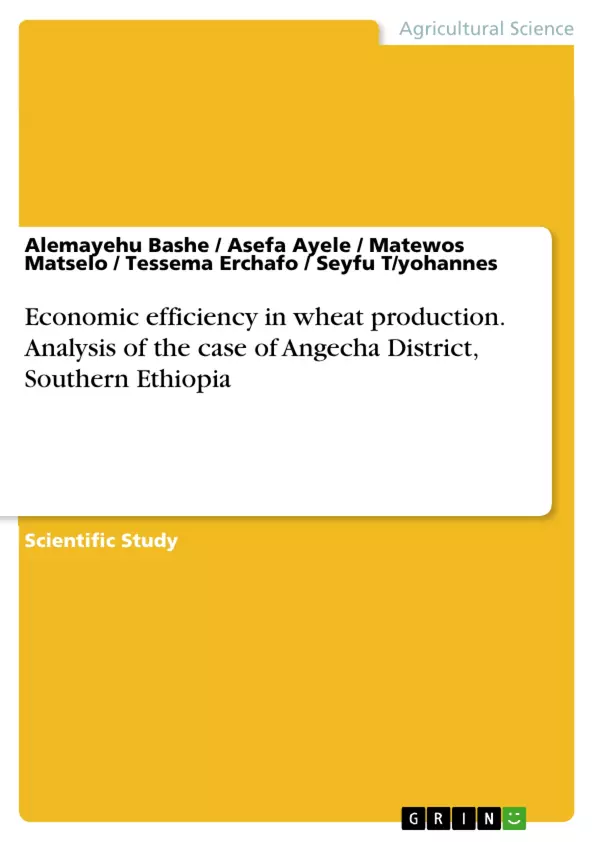Production improvement through the use of improved technologies and increasing efficiency of inputs in cereal production in general and wheat production in particular might be an important alternative to settle food security problem in Ethiopia. Wheat is the first cash crop produced in Angecha District, kembata Tambaro zone, with a total area covered of 4567.5ha. But, the efficiency of producers that they could not use available resources on hand was taken as a great attention.
So this study was aimed to analyze the levels of technical, allocative and economic efficiencies of wheat producers; and determining factors for inefficiency in farmers’ wheat production by using cross sectional data from randomly selected 123 households in 2018/19 production year.
The study used both primary and secondary data sources and stochastic production frontier approach was used to estimate the level of efficiencies. Ordinary least square estimation was used to identify factors that affect inefficiencies of sample farmers’ in study area. The regression model result indicated that input variables like land and seed were the significant variables to increase the yield of wheat output. 55.63%, 55.47% and 30.85% were the estimated mean values of technical, allocative and economic efficiencies respectively, which indicate the presence of inefficiency in wheat production in the study area.
Model result indicated that technical inefficiency positively and significantly affected by sex of the household head, and negatively affected by age, farm experience, land fragmentation, credit access and total livestock unit. Similarly, allocative inefficiency positively and significantly affected by sex and negatively by credit access and total livestock holdings. In addition, economic inefficiency negatively and significantly affected by credit access and total livestock holdings.
The policy measures implied from the results include: working further for quality seed and sustainable land management, expansion of gender sensitive and youth based strengthening of the extension services and trainings, strengthening the existing credit institutions services, and expansion of new livestock technologies in the study area.
Inhaltsverzeichnis (Table of Contents)
- 1. INTRODUCTION
- 1.1. Background
- 2. METHODOLOGY
- 2.1. Description of the study area
- 2.2. Sampling technique and sample size determination
- 2.3. DATA COLLECTION, TYPE AND SOURCES
- 2.4. METHODS OF DATA ANALYSIS
- 3. Results and Discussions
- 4. Conclusion and Recommendation
- 5. References
Zielsetzung und Themenschwerpunkte (Objectives and Key Themes)
This study aims to analyze the levels of technical, allocative, and economic efficiencies of wheat producers in Angecha District, southern Ethiopia. The study also seeks to identify factors that contribute to inefficiency in wheat production. The research uses cross-sectional data collected from 123 randomly selected households in the 2018/19 production year.
- Economic efficiency in wheat production
- Technical, allocative, and economic efficiencies
- Factors influencing wheat production inefficiencies
- Policy recommendations for improving wheat production
- Stochastic production frontier approach
Zusammenfassung der Kapitel (Chapter Summaries)
The first chapter provides background information on wheat production in Ethiopia and outlines the research objectives and problem statement. The second chapter details the study's methodology, including the study area description, sampling techniques, data collection methods, and data analysis procedures. The third chapter presents the findings of the analysis and discusses the results. The fourth chapter concludes the study and provides recommendations for policymakers and stakeholders.
Schlüsselwörter (Keywords)
The main keywords and focus topics of this study include: Angecha, economic efficiency, frontier, wheat production, technical efficiency, allocative efficiency, economic inefficiency, stochastic production frontier approach, input variables, credit access, livestock holdings, land fragmentation, gender sensitivity, extension services, and policy recommendations.
- Arbeit zitieren
- Alemayehu Bashe (Autor:in), Asefa Ayele (Autor:in), Matewos Matselo (Autor:in), Tessema Erchafo (Autor:in), Seyfu T/yohannes (Autor:in), 2023, Economic efficiency in wheat production. Analysis of the case of Angecha District, Southern Ethiopia, München, GRIN Verlag, https://www.hausarbeiten.de/document/1320287


